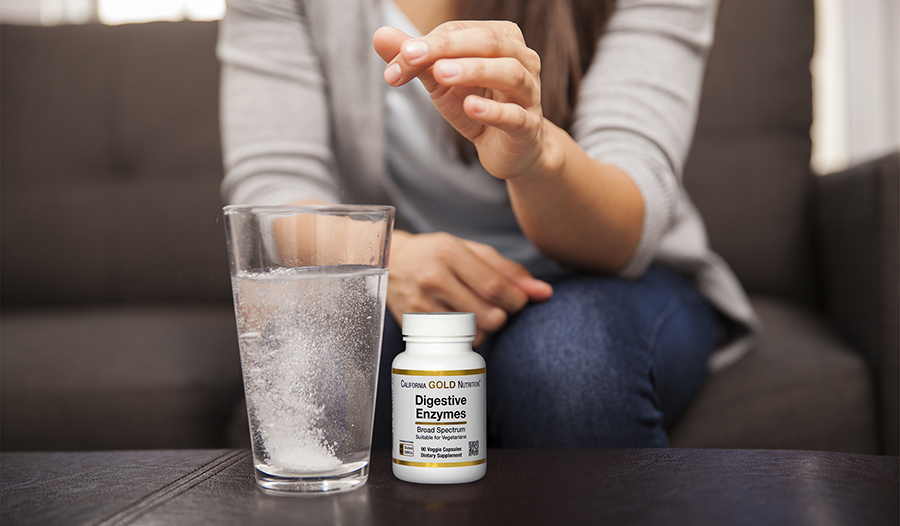The Best 5 Natural Approaches to Indigestion, According to a Naturopathic Doctor

Indigestion is a common concern. Usually defined as discomfort, heartburn, bloating, gas, or pain related to the upper gastrointestinal tract. Estimates suggest that around 20% of the population suffers from indigestion on a regular basis.
While specific causes can’t always be identified, many can be ruled out. For example, one common cause of indigestion is an overgrowth in the Ie stomach of the bacteria Helicobacter pylori. Peptic ulcers and gastroesophageal reflux are also common causes of heartburn. Consulting a physician is always a good idea with chronic digestive issues.
That said, in many cases where a person is suffering from indigestion without any identifiable cause, several natural treatments stand out that may be of potential benefit.
Probiotics for Indigestion
Probiotics are beneficial bacteria or yeast typically used to improve digestive symptoms. The gastrointestinal tract is lined with bacteria that can play a complementary role in digestion. If something goes wrong, and certain problematic bacteria overgrow, digestive symptoms can result. A simple approach to try and stimulate the immune system and help clear the problematic bacteria is through the use of probiotics.
For treating indigestion, the research is not robust, but it still suggests benefits with probiotics. The available research also shows that a mixture of probiotic organisms is better than single-organism probiotic formulations. Due to the need for more research, specific species or strains of bacteria that have consistent benefits have not been well identified.
If symptoms of indigestion are combined with irritable bowel syndrome—diarrhea or constipation and lower abdominal pain related to bowel movements—the likelihood of benefits is even higher with probiotics.
Interestingly, probiotics are showing benefits for conditions beyond digestion. Therefore, their use may allow for helping to reduce symptoms of other conditions in conjunction with their gastrointestinal benefits. Research suggests that certain probiotics may be helpful for allergies, preventing respiratory infections, improving mental health, and assisting with weight loss.
Probiotics come in numerous different brands and types, making it somewhat confusing to decide on a product. In general, a product that lists well-studied strains of bacteria that have been used in clinical trials is typically preferred. If one brand of probiotics is not helpful, trying a different product with different bacterial strains may still yield benefits.
Digestive Enzymes and Indigestion
Digestive enzymes are a way of supporting the digestion of food to reduce or eliminate digestive symptoms. Digestion is a complicated process that starts in the mouth and finishes in the small intestine, where most nutrients are finally absorbed. Due to the complexity of digestion, it’s not unusual for something to go wrong. Food that is not well digested can provide a food source for bacteria in the gastrointestinal tract, which in turn can create or increase digestive tract symptoms. By assisting digestion with digestive enzymes, the digestive process may be restored and symptoms reduced.
Studies on digestive enzymes are not robust, but they do appear to show benefit for a number of digestive conditions, including irritable bowel syndrome and nonceliac gluten (wheat) sensitivity. The most direct study out of China evaluated digestive enzymes for indigestion and found efficacy of 80% for the reduction of common symptoms. When supplementing with digestive enzymes, they are usually taken at the beginning of meals to maximize benefits.
Fiber for Indigestion
While often the butt of jokes, fiber is beneficial for more than just constipation. In fact, research suggests that dietary fiber reduces the risk of death from all causes by 11% for every increase of 10 grams of fiber consumed per day. Fiber has been shown to have potential benefits for weight loss and blood sugar control. It even helps reduce the risk of heart disease.
For digestive symptoms, soluble fiber has also been shown to be of benefit. A meta-analysis of the published research concluded that soluble fiber is effective for reducing the symptoms of irritable bowel syndrome, which commonly overlaps with simple indigestion. In children, partially hydrolyzed guar gum, a type of soluble fiber, was found to improve functional abdominal pain. However, it is worth recognizing that some individuals respond negatively to fiber with increased gas and bloating. Fibers with the least propensity for causing gas and bloating that are still often of benefit include partially hydrolyzed guar gum and acacia fiber.
Peppermint for Indigestion
Peppermint has a long history of use as a soothing herb for the digestive tract. Known for its antispasmodic effects, peppermint relaxes muscles throughout the gastrointestinal tract and has some mild pain-relieving properties. In addition, peppermint has both antibacterial and antiviral properties, which may be relevant to its effects on gastrointestinal flora. Studies exploring the use of peppermint oil for irritable bowel syndrome have typically found significant benefits with a reduction in irritable bowel symptoms. These studies used enteric-coated capsules containing peppermint oil. The coated capsule prevents the release of the oil in the stomach and instead delivers the peppermint oil to the small intestine.
For indigestion, a combination of peppermint oil and caraway oil in an enteric-coated capsule has been found to be effective at improving symptoms as well. In one study, upper abdominal pain and discomfort were both significantly reduced with four weeks of treatment. While typically quite safe, some people do have increased heartburn with peppermint oil. If an individual experiences heartburn on a regular basis, the use of peppermint oil should be approached with caution because heartburn may worsen for some individuals.
While peppermint tea can help in some cases, most research has focused on enteric-coated peppermint oil.
Apple Cider Vinegar for Indigestion
Apple cider vinegar (ACV) is an old folk remedy for almost everything. If you search online, you can find people talking about how ACV helped them with almost any symptom or condition. While it is best studied for its blood-sugar-lowering effects, studies also suggest that it may have benefits for reducing total cholesterol and triglycerides.
While it is worth recognizing that no published research exists on the use of ACV for gastrointestinal complaints, the anecdotal evidence and safety of ACV, when used properly, still make it a remedy worth considering. Often used for heartburn, some evidence suggests that the lower esophageal sphincter is acid sensitive, meaning that it closes when exposed to acid. ACV may be a simple way, in some individuals, to keep the sphincter closed after a meal to help prevent heartburn. However, since the product itself is acidic, a subset of individuals may notice no benefits or even a worsening of symptoms. In these individuals, ACV should not be continued.
Because ACV is fermented, a raw product will typically contain some probiotic organisms that can also help improve gastrointestinal symptoms. When trying to maximize the gastrointestinal effects of ACV, I usually recommend a raw product, except in cases where a person is immunocompromised.
To consume ACV safely, it should be diluted in water. Vinegar can damage teeth and burn the esophagus if used at full strength. While vinegar tablets or pills exist, research has found some products to be of questionable purity and safety. Vinegar typically contains 4%-8% acetic acid, with the remainder being mostly water.
To make a powder, this water must be removed, which would concentrate the acid. Highly concentrated acetic acid is caustic and quite dangerous, burning tissues readily. A case report documenting an esophageal burn from vinegar tablets has been reported. When diluted in water, standard, liquid ACV retains its benefits and minimizes risks. After consumption, rinsing the mouth with water is still a good idea to help protect the teeth.
A separate case report also suggests that large amounts of vinegar on a daily basis can deplete potassium and cause bone loss. In the report, the individual was consuming 8.5 ounces of vinegar a day for six years, well over the more typical one-half to one ounce daily that is often recommended. Nevertheless, in individuals with known low potassium, consuming vinegar as a supplement on a regular basis should be approached with caution and potassium levels monitored.
Takeaway
Indigestion is a common concern that often doesn’t have a readily identifiable cause. For individuals struggling with consistent indigestion, natural remedies can help reduce or eliminate symptoms. When used appropriately, most natural treatments are quite safe and have a minimum of side effects. Treatments including probiotics, digestive enzymes, peppermint, fiber, and ACV may be helpful for certain individuals.
References:
- Bontempo I, Piretta L, Corazziari E, Michetti F, Anzini F, Torsoli A. Effects of intraluminal acidification on oesophageal motor activity. Gut. 1994;35(7):884-890. doi:10.1136/gut.35.7.884
- Didari T, Mozaffari S, Nikfar S, Abdollahi M. Effectiveness of probiotics in irritable bowel syndrome: Updated systematic review with meta-analysis. World J Gastroenterol. 2015;21(10):3072-3084. doi:10.3748/wjg.v21.i10.3072
- Ferrarese R, Ceresola ER, Preti A, Canducci F. Probiotics, prebiotics and synbiotics for weight loss and metabolic syndrome in the microbiome era. Eur Rev Med Pharmacol Sci. 2018;22(21):7588-7605. doi:10.26355/eurrev20181116301
- Ford AC, Marwaha A, Sood R, Moayyedi P. Global prevalence of, and risk factors for, uninvestigated dyspepsia: a meta-analysis. Gut. 2015;64(7):1049-1057. doi:10.1136/gutjnl-2014-307843
- Hadi A, Pourmasoumi M, Najafgholizadeh A, Clark CCT, Esmaillzadeh A. The effect of apple cider vinegar on lipid profiles and glycemic parameters: a systematic review and meta-analysis of randomized clinical trials. BMC Complement Med Ther. 2021;21(1):179. Published 2021 Jun 29. doi:10.1186/s12906-021-03351-w
- Hao Q, Dong BR, Wu T. Probiotics for preventing acute upper respiratory tract infections. Cochrane Database Syst Rev. 2015;(2):CD006895. Published 2015 Feb 3. doi:10.1002/14651858.CD006895.pub3
- Hill LL, Woodruff LH, Foote JC, Barreto-Alcoba M. Esophageal injury by apple cider vinegar tablets and subsequent evaluation of products. J Am Diet Assoc. 2005;105(7):1141-1144. doi:10.1016/j.jada.2005.04.003
- Huaman JW, Mego M, Bendezú A, et al. Correction of dyssynergic defecation, but not fiber supplementation, reduces symptoms of functional dyspepsia in patients with constipation in a randomized trial. Clin Gastroenterol Hepatol. 2020;18(11):2463-2470.e1. doi:10.1016/j.cgh.2019.11.048
- Huang YJ, Marsland BJ, Bunyavanich S, et al. The microbiome in allergic disease: Current understanding and future opportunities – 2017 PRACTALL document of the American Academy of Allergy, Asthma & Immunology and the European Academy of Allergy and Clinical Immunology. J Allergy Clin Immunol. 2017;139(4):1099-1110. doi:10.1016/j.jaci.2017.02.007
- Ido H, Matsubara H, Kuroda M, et al. Combination of gluten-digesting enzymes improved symptoms of non-celiac gluten sensitivity: a randomized single-blind, placebo-controlled crossover study. Clin Transl Gastroenterol. 2018;9(9):181. Published 2018 Sep 19. doi:10.1038/s41424-018-0052-1
- Järbrink-Sehgal E, Andreasson A. The gut microbiota and mental health in adults. Curr Opin Neurobiol. 2020;62:102-114. doi:10.1016/j.conb.2020.01.016
- Khanna R, MacDonald JK, Levesque BG. Peppermint oil for the treatment of irritable bowel syndrome: a systematic review and meta-analysis. J Clin Gastroenterol. 2014;48(6):505-512. doi:10.1097/MCG.0b013e3182a88357
- Liu L, Wang S, Liu J. Fiber consumption and all-cause, cardiovascular, and cancer mortalities: a systematic review and meta-analysis of cohort studies. Mol Nutr Food Res. 2015;59(1):139-146. doi:10.1002/mnfr.201400449
- Lua PL, Roslim NA, Ahmad A, Mansor M, Aung MMT, Hamzah F. Complementary and alternative therapies for weight loss: a narrative review. J Evid Based Integr Med. 2021;26:2515690X211043738. doi:10.1177/2515690X211043738
- McKay DL, Blumberg JB. A review of the bioactivity and potential health benefits of peppermint tea (Mentha piperita L.). Phytother Res. 2006;20(8):619-633. doi:10.1002/ptr.1936
- Moayyedi P, Quigley EM, Lacy BE, et al. The effect of fiber supplementation on irritable bowel syndrome: a systematic review and meta-analysis. Am J Gastroenterol. 2014;109(9):1367-1374. doi:10.1038/ajg.2014.195
- Rich G, Shah A, Koloski N, et al. A randomized placebo-controlled trial on the effects of Menthacarin, a proprietary peppermint- and caraway-oil-preparation, on symptoms and quality of life in patients with functional dyspepsia. Neurogastroenterol Motil. 2017;29(11):10.1111/nmo.13132. doi:10.1111/nmo.13132
- Romano C, Comito D, Famiani A, Calamarà S, Loddo I. Partially hydrolyzed guar gum in pediatric functional abdominal pain. World J Gastroenterol. 2013;19(2):235-240. doi:10.3748/wjg.v19.i2.235
- Singh VP, Sharma J, Babu S, Rizwanulla, Singla A. Role of probiotics in health and disease: a review. J Pak Med Assoc. 2013;63(2):253-257.
- Wu Y, Zhang S, Yu Z, et al. [Efficacy of compound digestive enzyme tablet for dyspeptic symptoms: a randomized double-blind parallel controlled multicenter clinical trial in China]. Zhonghua Yi Xue Za Zhi. 2014;94(42):3326-3328.
- Zhang J, Wu HM, Wang X, et al. Efficacy of prebiotics and probiotics for functional dyspepsia: A systematic review and meta-analysis. Medicine (Baltimore). 2020;99(7):e19107. doi:10.1097/MD.0000000000019107
DISCLAIMER:This Wellness Hub does not intend to provide diagnosis...
















































































 Table of Contents
Table of Contents















